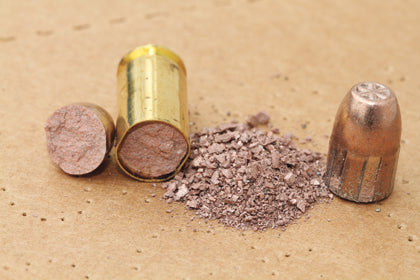Frangible ammunition refers to a type of specialized bullet designed to break apart upon impact with a hard target. The term "frangible" comes from the word "fracture," indicating that the bullet is designed to fragment into smaller pieces upon impact rather than penetrate through the target. Frangible bullets are typically made from compressed powdered metal or a combination of metal powders and binding agents.
Here are some key characteristics and applications of frangible ammunition:
1. Reduced Ricochet and Overpenetration: Frangible bullets are designed to disintegrate upon impact, which helps to minimize the risk of ricochets and overpenetration. This makes frangible ammunition particularly suitable for use in environments where the potential for collateral damage is a concern, such as indoor shooting ranges or close-quarters training scenarios.
2. Safety and Steel Target Shooting: Frangible ammunition is often used for shooting on steel targets. The bullet's tendency to break apart upon impact reduces the risk of bullet fragments bouncing back towards the shooter or bystanders. This makes frangible ammunition a safer option for target shooting on steel plates or other hard surfaces.
3. Training and Law Enforcement Applications: Frangible ammunition is commonly used for training purposes, particularly in law enforcement and military applications. It allows for realistic shooting scenarios while minimizing the risk of injuries from ricochets or overpenetration.
4. Reduced Penetration in Home Defense: Frangible ammunition can be considered for home defense situations where the concern for overpenetration and the potential for collateral damage is high. The tendency of frangible bullets to break apart upon impact may help reduce the risk of the bullet penetrating walls or other barriers and potentially harming unintended targets.
It's important to note that frangible ammunition may have limitations in terms of terminal ballistics and penetration. Due to the bullet's tendency to break apart, frangible bullets may not penetrate as deeply as conventional ammunition. This can affect their effectiveness against certain targets or in situations where deeper penetration is desired.
When considering frangible ammunition, it's crucial to select ammunition specifically designed for the intended purpose and to understand its limitations. Always consult with manufacturers' recommendations and consider factors such as target type, distance, and the specific application to determine whether frangible ammunition is suitable for your needs.
Here are some key characteristics and applications of frangible ammunition:
1. Reduced Ricochet and Overpenetration: Frangible bullets are designed to disintegrate upon impact, which helps to minimize the risk of ricochets and overpenetration. This makes frangible ammunition particularly suitable for use in environments where the potential for collateral damage is a concern, such as indoor shooting ranges or close-quarters training scenarios.
2. Safety and Steel Target Shooting: Frangible ammunition is often used for shooting on steel targets. The bullet's tendency to break apart upon impact reduces the risk of bullet fragments bouncing back towards the shooter or bystanders. This makes frangible ammunition a safer option for target shooting on steel plates or other hard surfaces.
3. Training and Law Enforcement Applications: Frangible ammunition is commonly used for training purposes, particularly in law enforcement and military applications. It allows for realistic shooting scenarios while minimizing the risk of injuries from ricochets or overpenetration.
4. Reduced Penetration in Home Defense: Frangible ammunition can be considered for home defense situations where the concern for overpenetration and the potential for collateral damage is high. The tendency of frangible bullets to break apart upon impact may help reduce the risk of the bullet penetrating walls or other barriers and potentially harming unintended targets.
It's important to note that frangible ammunition may have limitations in terms of terminal ballistics and penetration. Due to the bullet's tendency to break apart, frangible bullets may not penetrate as deeply as conventional ammunition. This can affect their effectiveness against certain targets or in situations where deeper penetration is desired.
When considering frangible ammunition, it's crucial to select ammunition specifically designed for the intended purpose and to understand its limitations. Always consult with manufacturers' recommendations and consider factors such as target type, distance, and the specific application to determine whether frangible ammunition is suitable for your needs.

